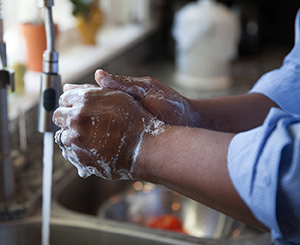Preventing Common Respiratory Infections
Preventing Common Respiratory Infections

What is a cold?
Symptoms include runny nose, coughing and sneezing, and sore throat. Cold symptoms tend to be milder than flu symptoms.
Symptoms tend to come on slowly. They last for a few days to about a week.
With a cold, you can still do most of the things you usually do.
What is the flu?
Symptoms include fever, headache, fatigue, cough, sore throat, runny nose, and muscle aches. Children may have upset stomach and vomiting, but adults usually don’t.
Symptoms tend to come on quickly. Some, such as fatigue and cough, can last a few weeks.
With the flu, you may feel worn out and not able to do normal activities.
It’s most likely NOT the flu if an adult has vomiting or diarrhea for a day or two. This so-called “stomach flu” is probably a GI (gastrointestinal) infection.
When the infection gets worse
Without proper care, a respiratory infection can get worse. It can lead to serious complications and death. If you aren’t getting better, call your healthcare provider. Complications can include:
Bronchitis (infection of the airways that leads to shortness of breath and coughing up thick yellow or green mucus)
Pneumonia (infection of the lungs in which fluid and mucus settle in the lungs, making breathing difficult)
Worsening of chronic conditions such as heart failure, chronic lung disease, asthma, or diabetes
Severe dehydration (loss of fluids)
Sinus problems
Ear infections
Get a flu vaccine
A flu vaccine protects you from influenza (but not other colds or infections). Get a vaccine each fall, before flu season starts. This can be done at a clinic, healthcare provider’s office, drugstore, senior center, or through your workplace.
Get pneumococcal vaccines
Pneumonia can be a complication of influenza. There are 2 pneumococcal pneumonia vaccines that protect against many types of pneumonia. Talk with your healthcare provider about these important vaccines.
Keep germs from spreading
No one likes getting sick. To protect yourself and others from cold and flu germs:
Wash your hands often. Use alcohol-based hand sanitizer when you don’t have access to soap and water.
Don’t touch your eyes, nose, and mouth. This may help you keep germs out of your body.
Try to avoid people with respiratory infections. You may want to stay out of crowds during flu season (winter).
Ask your healthcare provider if you should get a pneumonia vaccination.
How to wash your hands
Use warm water and plenty of soap. Work up a good lather.
Clean your whole hand, under your nails, between your fingers, and up your wrists. Wash for at least 15 to 20 seconds. Don’t just wipe—rub well.
Rinse. Let the water run down your fingertips, not up your wrists.
In a public restroom, use a paper towel to turn off the faucet and open the door.
Updated:
July 27, 2018
Reviewed By:
Blaivas, Allen J., DO,Image reviewed by StayWell art team.,Sather, Rita, RN